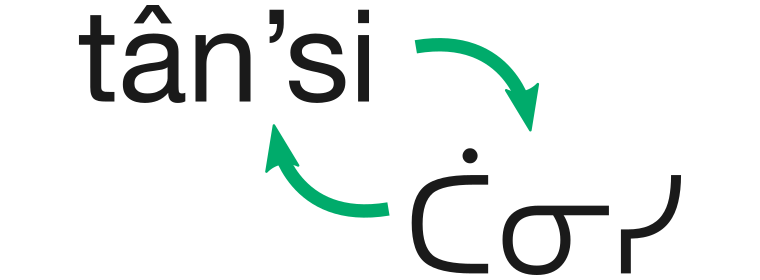Why I made yet another Cree syllabics converter

The Western Cree languages—Plains Cree, Woods Cree, and Swampy Cree—are written using two systems: one with letters borrowed from the English alphabet, in a system known as the standard Roman orthography (SRO), and ᓀᐦᐃᔭᐏ ᒐᐦᑭᐯᐦᐃᑲᓇ (Cree syllabics). SRO is relatively easy to type on a modern computer, but syllabics are more difficult, because of the lack of a well-established syllabics input layout. It’s easier to just use a converter which, given Cree text in SRO, produces Cree text in syllabics. In this post, I describe my criticisms of the converters that existed prior to July 2018, and introduce syllabics.app—a syllabics converter that I developed in reaction to the former converters.
What you need to know to understand this post
For the latter part of this blog post, where I discuss using the converter in your own project, I assume you know how to use:
If you don’t care about embedding my converter in your coding project, then there’s no prior technical knowledge needed!
What are the freely available transliterators?
A quick Google search will net you at least the following SRO to syllabics transliterators.
- The Maskwacîs Plains Cree Syllabic Converter1
- The Algonquian Linguistic Atlas Cree Syllabics Converter
- Syllabics.net’s Plains Cree Syllabics Converter
However, none of these transliterators are perfect.
The issues
Word final “hk”
In syllabics, a word that ends with an “hk”—or «ᐠ» in syllabics—are supposed end with «ᕽ» instead. However, this replacement can never occur in the middle of a word.
For example, the word “ê-wêpâpîhkêwêpinamâhk” (we (and not you) are setting it swinging), contains both a final “hk” and a “hk” cluster in the middle of the word. Its syllabic transcription is ᐁᐍᐹᐲᐦᑫᐍᐱᐊᒫᕽ.
The Algonquian Linguistic Atlas’s converter and syllabics.net’s converter both handle the conversion of “hk” to «ᐠ», without erroneously converting the sequence in the middle of a word. Notably, the community of Maskwacîs does not follow this convention. Therefore, the Maskwacîs Converter produces ᐁ ᐁᐧᐸᐱᐦᑫᐁᐧᐱᓇᒪᐦᐠ, unlike what is expected in other Cree communities.
Transliterating non-Cree words
Some transliterators attempt to convert every Latin character, even if it doesn’t make sense. Take the case of “Maskêkosihk Trail”—a road that goes from Edmonton to Enoch Cree Nation. The City of Edmonton unveiled the street sign, and, in the process, they unveiled an embarrassment:

Not only does the syllabics transliteration of the sign contain the “hk” cluster as mentioned above,2 but it half-transliterates the English word “trail” into syllabics. The result is that “trail” is rendered as «ᐟrᐊᐃl», which contains Latin characters in the transliteration!
In my opinion, an SRO to syllabics transliterator should refuse to transliterate words that do not have the structure of a Cree word. However, all three of the mentioned transliterators do attempt to transliterate “trail” with differing results:3
| Maskwacîs Cree Dictionary | ᐟrᐊᐃl |
| Algonquian Linguistic Atlas | ᐟᕒᐊᐃᐪ |
| Syllabics.net | ᐟᕒᐊᐃᓬ |
Long vowels
Long vowels (êîôâ) are distinct from short vowels (ioa) in Cree. Long vowels are written with a dot above in syllabics. The exception is for “ê” because it is always long; as a result, some writers also drop the diacritic when writing “e” in SRO as well. It’s important to differentiate between long and short vowels, because it makes distinctions between words. For example, nipiy/ᓂᐱᕀ means “water” while nîpiy/ᓃᐱᕀ means “leaf”. However, there is such a thing as “plain” script, where the vowel dots are omitted, and pointed script where the vowels have all dots.
Another complication is that the “standard” Roman orthography in practice has multiple conventions for writing long vowels: using a macron (◌̄) and using a circumflex (◌̂).4
How do the various converters handle long vowel diacritics? The Maskwacîs converter does not produce dots for long vowels at all, however it accepts both macrons and circumflexes as input. The Algonquian Lingustic Atlas’s converter not only produces dots, but supports input in either macrons or circumflexes. The syllabics.net converter does worst of all, handling only macrons for long vowels. It simply spits out characters written with circumflexes. Additionally, it does not handle “ê” without an diacritics, which all other converters do.
Other odds and ends
Other issues for syllabics converters include how they deal with dashes, how they deal with combining diacritics, rather than pre-composed characters, and whether they produce the correct Unicode characters for the syllabics rather than very convincing look-alikes. There’s also the sandhi orthographic rule, but honestly, I’m not sure I fully comprehend how to apply this rule myself.
Summary
Here’s a breakdown of the previous issues, and whether each transliterator can handle it correctly.
| Word-final “hk” | Non-Cree words | Long vowels | |
|---|---|---|---|
| Maskwacîs Cree Dictionary | * | ❌ | ❌ |
| Algonquian Linguistic Atlas | ✅ | ❌ | ✅ |
| Syllabics.net | ✅ | ❌ | ❌ |
Where’s the source code?
The most pressing issue to me personally is that I cannot find source code for any of these converters! This means that if other people want to incorporate a converter into their own app without an active internet connection, they can’t. They have to either reverse-engineer the converters online, or write their own code to do the conversion.
cree-sro-syllabics: an open-source Python and JavaScript library for syllabics conversion
My solution was to create a code library that is free and open source. It is available both for Python and JavaScript, and you can try it out right now!
It handles all the issues previously mentioned. Try it with the following test cases:
The source code for cree-sro-syllabics can be found on their respective GitHub repositories:
But it can also be seamlessly incorporated into a Python project that uses pip by installing it with:
pip install cree-sro-syllabics
Or, you can use npm to install cree-sro-syllabics in your JavaScript project:
npm install cree-sro-syllabics --save
Or you can copy-paste the .js file to your project.
Use cases
Most folks will just use syllabics.app to convert a few words or sentences of Cree.
However, software developers can embed the converter in clever ways in their application. For example, I’ve used the converter in itwêwina — the Plains Cree dictionary. Although the underlying dictionary content is written entirely in SRO, we can present all Cree text in syllabics. In addition, we support searches in syllabics by using cree-sro-syllabics to convert the search string to SRO first, then search our dictionary content.
How can you use cree-sro-syllabics?
Note: This blog post has been adapted from a post on Eddie’s blog.
-
This is the same converter bundled in the Cree Dictionary app. ↩
-
This may not be a mistake; they could be using Maskwacîs’s conventions, but I’m really not sure. ↩
-
I strongly suspect the sign designer used the Maskwacîs transliterator to get this result. ↩
-
Anecdotally, I find that most writers near Edmonton and Maskwacîs prefer circumflexes to macrons; however noted Algonquian linguist Arok Wolvengrey prefers macrons. Heck, Jean Okimāsis writes her surname with a macron! ↩
 Never miss a
story from us, subscribe to our newsletter
Never miss a
story from us, subscribe to our newsletter